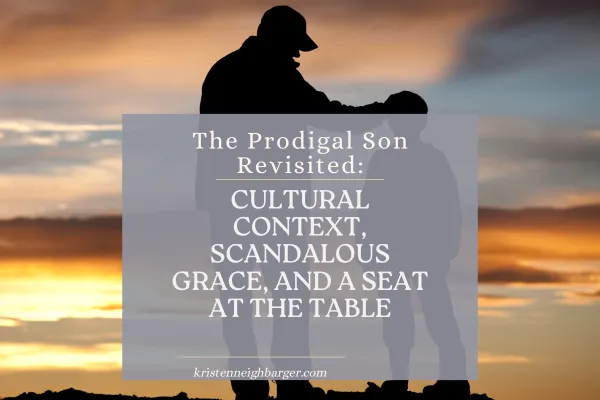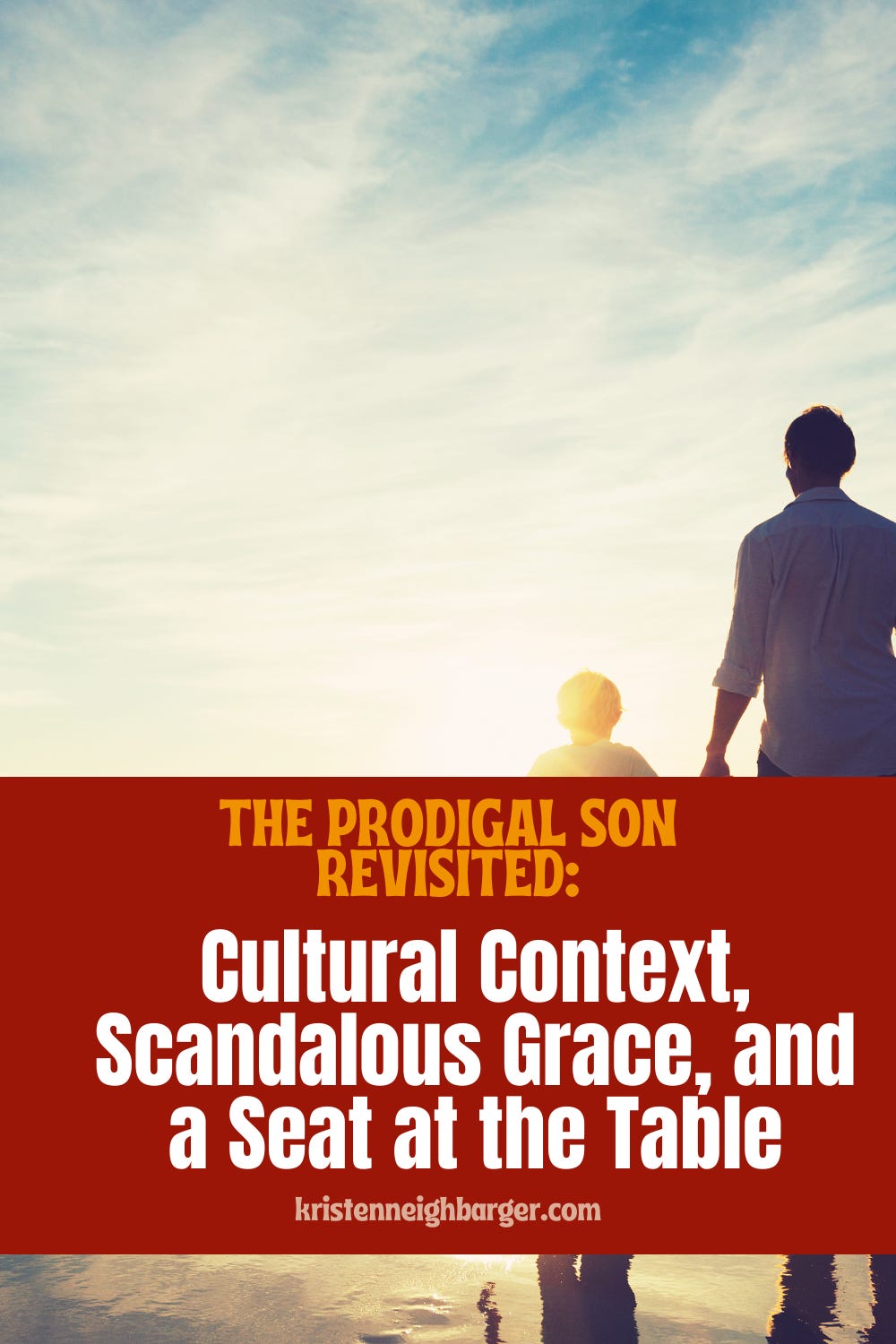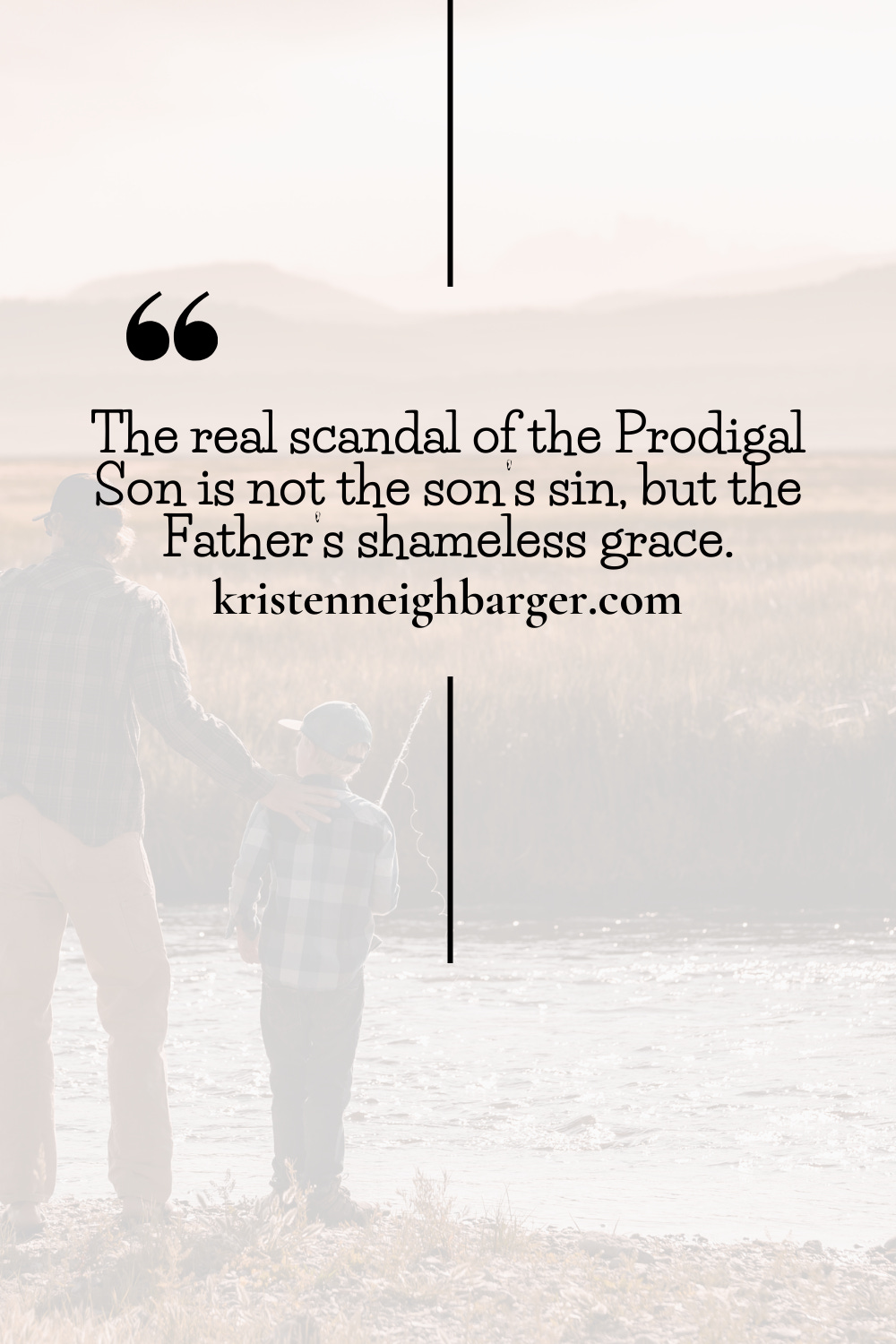
The Prodigal Son Revisited
It’s that confusing climate time in the Midwest where you can experience multiple seasons in one day. You might wake up to jacket weather and then be roasting with a triple-digit real feel by midday. We were experiencing one of these ultra-ridiculous, “feels like the devil’s armpit” heat waves last weekend as my husband and I were in an all-day outdoor sprint to complete projects.
In the middle of our project, when the sun was at its peak and I was questioning the symptoms of heat stroke, my watch buzzed. A comment popped up on Instagram:
“I don’t think Jesus was inclusive at all…”
Oh boy.
Later, after recovering from what felt like the surface of the sun, I went back to find the comment. It was gone. Either they blocked me and my “heresy,” or deleted it. Honestly, I was fine with either option.
But it got me thinking. What must it be like to live in a world where Jesus isn’t inclusive?
Where grace has to be earned.
Where obedience is the only measure of goodness.
Where sin is the focus.
Where performance trumps authenticity.
Where your seat at the table has to be earned.

Jesus Welcomes the Outcasts (Luke 15)
Luke opens chapter 15 with a scene: tax collectors and sinners gathered to hear Jesus teach. The religious leaders were indignant. They grumbled that He welcomed everyone.
In response, Jesus tells three parables—the lost coin, the lost sheep, and the lost son. In Western culture, we call the last one “The Prodigal Son,” but many scholars argue it should be called The Parable of the Loving Father.
Why? Because if you focus only on the son, you miss the heart of the story.
Jewish Religious Framework: Law, Purity, and Honor
To understand the weight of this parable, you need to step into the Jewish worldview of the time.
Covenant and Torah: Faithfulness meant strict obedience to the Law and participation in worship.
Purity and Separation: Maintaining ritual and moral purity mattered. Boundaries were sharp between clean/unclean, Jew/Gentile, righteous/sinner.
Honor and Community Standing: A person’s honor was tied to obedience. “Sinners” threatened the holiness of the entire community.
At the heart of first-century Judaism was law, honor, and merit.
Cultural Context of the Prodigal Son
So why would this story have shocked Jesus’ listeners? Because every part of it cut against the grain of their world.
Inheritance: Asking early was basically saying, “Dad, I wish you were dead.” That wasn’t just rude—it was a total breach of family honor. Most fathers would’ve refused, punished, or even disowned a son for asking. This father didn’t.
Leaving the land: Land wasn’t just real estate; it was tied to identity, family honor, and God’s covenant. To sell your share and walk away was more than moving out. It was walking out on your people and your place in God’s promises.
Rock bottom: When famine hit, the son ended up feeding pigs. For a Jewish audience, that was as low as you could go. But worse—he longed for the pigs’ food. He had sunk beneath unclean animals themselves.
Kezazah ceremony: Everyone listening would’ve expected the village to meet this son with judgment. They had a whole ritual for it—breaking a clay pot at his feet and declaring him cut off forever. It was public, humiliating, and final.
The father running: And here’s the part that would’ve made the crowd gasp. A dignified man didn’t run. To hike up your robe and sprint down the road was humiliating. But this father runs anyway—likely to reach his son before the villagers could, shielding him from shame by taking it on himself.
And then, instead of punishment, comes restoration: a robe for honor, a ring for authority, sandals for belonging. Each one saying to the whole community, “This son belongs. He is mine.”

The Older Brother’s Response
And then comes the older brother.
The “responsible” one, yet his refusal to join the feast shames his father too. His complaint reveals his heart: “I’ve slaved for you all these years.” He’s operating out of duty, not love. Transaction, not relationship.
This is where Jesus aims straight at the Pharisees. They weren’t wild rebels, but they were just as far from the Father’s heart—resentful that God’s love could be given so freely.
The Scandalous Grace of God
This is not just a family reunion story. It’s scandalous. Upside-down. And it’s meant to make us ask: where do I see myself in this story?
Maybe you’ve been the younger son—convinced you’ve gone too far, burned too many bridges, and lost your place at the table.
Maybe you’ve been the older son—working, striving, slaving away to earn approval, only to find yourself resentful and exhausted.
Or maybe you’ve been the neighbor, standing at the edge, quick to enforce the rules and ready to cut people off.
Wherever you land, the Father’s response doesn’t change. He runs. He embraces. He restores. He calls you child before you can prove yourself, explain yourself, or clean yourself up.
And here’s the best part: the Father doesn’t just welcome you home—He throws a feast. He pulls out a chair and says, “You belong at My table.”
This parable isn’t only about a prodigal son or a self-righteous brother. It’s about a Father who will not stop until every seat at His table is filled. That’s the gospel the Pharisees couldn’t stomach. And it’s the invitation still open to us today.
Reflection Questions
Where do you find yourself in this story right now—the younger son, the older son, or the father?
What parts of your story have felt “too far gone,” and how does this parable speak to that?
Who in your life might need you to show them the Father’s kind of welcome this week?
Friend, you belong here. You belong with Him. And you belong at this table.
